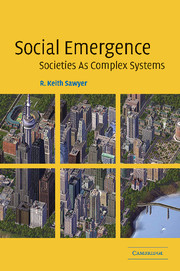Book contents
- Frontmatter
- Contents
- List of figures and tables
- Acknowledgments
- 1 Emergence, complexity, and social science
- 2 The third wave of social systems theory
- 3 The history of emergence
- 4 Emergence in psychology
- 5 Emergence in sociology
- 6 Durkheim's theory of social emergence
- 7 Emergence and elisionism
- 8 Simulating social emergence with artificial societies
- 9 Communication and improvisation
- 10 The Emergence Paradigm
- References
- Index
1 - Emergence, complexity, and social science
Published online by Cambridge University Press: 10 May 2010
- Frontmatter
- Contents
- List of figures and tables
- Acknowledgments
- 1 Emergence, complexity, and social science
- 2 The third wave of social systems theory
- 3 The history of emergence
- 4 Emergence in psychology
- 5 Emergence in sociology
- 6 Durkheim's theory of social emergence
- 7 Emergence and elisionism
- 8 Simulating social emergence with artificial societies
- 9 Communication and improvisation
- 10 The Emergence Paradigm
- References
- Index
Summary
How it is possible that institutions … can arise without a common will aiming at their creation [is] the significant, perhaps the most significant, problem of the social sciences.
Carl MengerSocieties have often been compared to other complex systems. Inspired by the rise of science and technology, writers in the eighteenth century compared societies to complex artificial mechanisms like clocks; such metaphors are now broadly known as mechanistic (La Mettrie [1748] 1912). Inspired by Darwin's influential theory of evolution, nineteenth-century organicists compared the various institutions of society to the organs of the human body (Paul von Lilienfeld, Albert Schäffle, and Herbert Spencer). Just after World War II, Talcott Parsons' influential structural-functional theory was inspired by cybernetics, the study of “control and communication in the animal and the machine,” the subtitle of a seminal book published by mathematician Norbert Wiener in 1948. Cybernetics was centrally concerned with developing models of the computational and communication technologies emerging in the postwar period, but many cyberneticians applied these models to biology, anthropology, and sociology. In the 1960s and 1970s, general systems theory continued in this interdisciplinary fashion; it was grounded in the premise that complex systems at all levels of analysis – from the smallest unicellular organisms up to modern industrial societies – could be understood using the same set of theories and methodologies (Bertalanffy 1968; J. Miller 1978).
Information
- Type
- Chapter
- Information
- Social EmergenceSocieties As Complex Systems, pp. 1 - 9Publisher: Cambridge University PressPrint publication year: 2005
Accessibility standard: Unknown
Why this information is here
This section outlines the accessibility features of this content - including support for screen readers, full keyboard navigation and high-contrast display options. This may not be relevant for you.Accessibility Information
- 1
- Cited by
